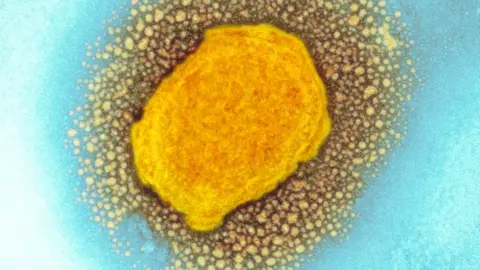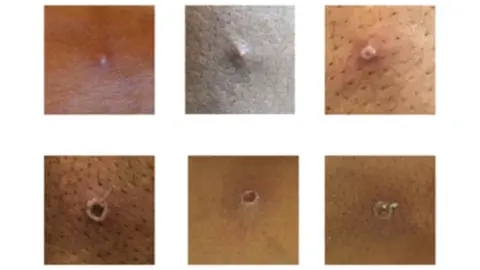UK monkeypox cases double to 20 - Sajid Javid
 Science Photo Library
Science Photo LibraryHealth Secretary Sajid Javid has said another 11 cases of monkeypox have been confirmed in the UK.
The new cases come on top of the nine already identified in the country.
Mr Javid said "most cases" are mild. He has now updated G7 health ministers on the spread of the virus, which has been detected in nine other countries outside Central and West Africa.
He said the UK was stocking up on smallpox vaccines to help guard against monkeypox.
"I can confirm we have procured further doses," he said.
A smallpox jab offers some good protection against monkeypox since the two viruses are quite similar.
The World Health Organization is convening an emergency meeting with experts about the spread.
Dr Hans Henri Kluge, WHO Regional Director for Europe, is concerned that transmission could accelerate as countries enter the summer "festival" season.
Cases of the disease outside Central and West Africa are rare, but some have been occurring recently in Europe, USA, Canada and Australia.
It is not clear how much vaccine stock has been bought by the UK, or how many jabs might be given.
Reports say Spain is preparing to order thousands of doses of smallpox vaccine to use against monkeypox.
Even without a vaccine, most cases clear up on their own within a few weeks. Severe cases sometimes can occur though.

What is monkeypox?
 UKHSA
UKHSAMonkeypox is usually associated with travel to Central or West Africa, but some of the cases that have been occurring outside these countries have had no travel link.
It does not spread easily between people, but it can be spread through:
- touching clothing, bedding or towels used by someone with the monkeypox rash
- touching monkeypox skin blisters or scabs
- the coughs or sneezes of a person with the monkeypox rash
If you get infected with monkeypox, it usually takes between five and 21 days for the first symptoms to appear.
Symptoms include fever, headache, muscle aches, backache, swollen lymph nodes, chills and exhaustion.
A rash can develop, often beginning on the face, then spreading to other parts of the body. The rash changes and goes through different stages - a bit like chicken pox - before finally forming a scab, which later falls off.
Read more about the virus here.

The UK Health Security Agency (UKHSA) says the risk to the public remains very low.
Anyone with concerns that they could be infected should see a health professional, but make contact with the clinic or surgery ahead of a visit. NHS 111 can also give advice.
Dr Susan Hopkins from the UKHSA said "a notable proportion" of the recent cases in the UK and Europe have been found in gay and bisexual men "so we are particularly encouraging them to be alert to the symptoms and seek help if concerned".
Her colleague, Prof Kevin Fenton, said: "We are asking everybody to be aware of the signs and symptoms, which include rashes around the mouth as well as around the genital area."
The Imvanex smallpox vaccine is about 85% effective in preventing monkeypox, studies suggest. Vaccination after a monkeypox exposure may help prevent the disease or make it less severe.
Vaccines work by teaching the immune system how to defend itself against a disease.
Routine smallpox vaccination ended in the 1970s in Britain, around the time the disease was eradicated, meaning many people have not got any protection or immune memory against these types of viruses.
